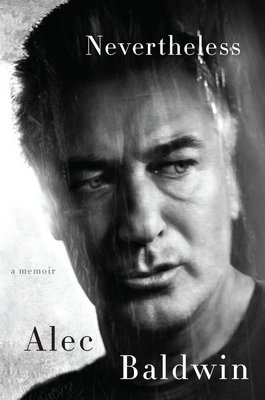
Why is it that whenever some of us think of Donald Trump, the face we see is that of Alec Baldwin? Just as his colleague at “30 Rock” Tina Fey nailed Sarah Palin (“I can see Russia from my house”), Mr. Baldwin has fixed in amber a parallel version of Mr. Trump (“My brain is bad,” “Fake news”), his mobile lips and dislocated gestures.
These alone would grant him a certain kind of immortality. This plus the fact that he is a multiple Emmy, Golden Globe, Screen Actors Guild Award winner. He has also been nominated for a Tony and an Oscar. Now he has written a memoir, “Nevertheless,” (Harper, 273 pp., $28.99) which is remarkably readable and frank.He began life one of six children in a small two-bedroom house in Massapequa. His father was a teacher who struggled desperately to support his large family on an inadequate income. His mother was a stay-at-home parent who could barely keep up with the demands of the household. “One might think that the residents of this house were operating a laundry business. There was laundry, in baskets, everywhere.” Both parents could hardly cope.
Mr. Baldwin escaped from home when he went to George Washington University, with the ultimate purpose of studying law. But it was acting whose siren call he heard. He studied acting at NYU’s Tisch Center for the Arts. His first minor break came when he got a continuing role in the soap opera “The Doctors.” But the road was not without its speed bumps. He fell in love with theater and with alcohol. “My most excellent friend.” Later it was drugs.
Mr. Baldwin is searingly honest about his inadequacies and his weaknesses. His marriage to Kim Basinger is a disaster. The divorce proceedings and the custody battle is limned in horrifying detail. He would have to fly from New York to Los Angeles every weekend to spend time with his daughter, Ireland. She was not always available, but he was always there if she needed him.
But through all the personal difficulties to be overcome, there was still the work that gave him so much satisfaction. He doesn’t hesitate to praise or blame anyone he worked with, or didn’t. Almost an entire chapter is devoted to giving thanks and speaking love to those who taught him and worked with him. He has special words for Tina Fey and for Julie Harris, and so many others too numerous to mention, his peers, his idols, living and dead.
Not everyone receives praise. One who doesn’t stands out. Mr. Baldwin felt that Harrison Ford took from him the starring role in the sequel to “The Hunt for Red October.” Mr. Ford, he says, “in person, is a little man, short, scrawny and wiry, whose soft voice sounds as if it’s coming from behind a door.” (He does have a way with words. He describes his mother’s slap as being akin to “Navratilova’s backhand.”) Mr. Baldwin has little use for Oliver Stone, of whom he says, “Stone opened my eyes to the Machiavellian filmmaker who would throw his own mother down a flight of stairs if it would help him get his project financed, get the shot he wanted, or simply get his way.”
He has a legendary temper, and is well known for his scraps with the paparazzi. But who can blame him.
Mr. Baldwin has an interest in politics, and has given both time and money to liberal causes. We should not be surprised if, at some time, he decides to run for office.
In the end it is his work and his philanthropic activity that gives him satisfaction. But it is his wife, Hilaria, and his children who give him love, and whom he loves in return. Hilaria keeps him centered and makes him see things in the right perspective. She says to him, “Even when I’m not with you, I still exist.”
“Nevertheless” is a voyage of discovery. It is modest, a rare quality in a showbiz memoir. As he says, “Every day, I’m filled with doubt about my choices. Every day. Writing this book presents a thousand such choices and thus, has been both painful and therapeutic. Nevertheless, I am grateful to those who will read it and allow me to share some of what I’ve seen, what I’ve learned, and who I believe I truly am.”